| Spotlight
Getting involved with BIO
Star Campus Desk
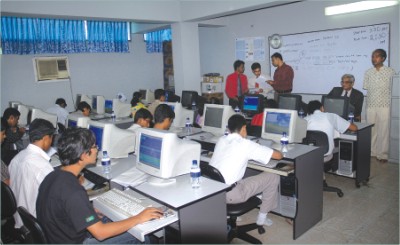
It was a pleasure for us to get involved with the Bangladesh Informatics Olympiad (BIO) 2008 annual event, which took place in five divisions simultaneously on Friday, 12 March. It all started when Associate Professor M H Kabir contacted us with the proposal of joining the event as the media partner. Considering the importance of the event we discussed the matter with the Editor of The Daily Star, Mr Mahfuz Anam and he gave his consent quite readily. Casually we asked Prof Kabir whether any organization was sponsoring the event. He said because of time constraint he could not approach any organization with the proposal. We told him that we would discuss the matter with Unitrend Ltd. and see what transpired. Later that day we had a meeting with Mr Nazmul Karim of Unitrend Ltd. and Mr Shahed Mustafa
 Mujahid, Marketing Manager Beverage, Nestle Bangladesh Ltd. After hearing in details about the BIO programme, which was being organized by eminent BUET professors and academics of the Bangladesh Academy of Sciences, Mr Shahed could grasp the importance of the programme in our national context and agreed to join it as the sponsor. It was then decided that Nescafe 3 in 1 would be the official sponsor of the event in all the venues. Mujahid, Marketing Manager Beverage, Nestle Bangladesh Ltd. After hearing in details about the BIO programme, which was being organized by eminent BUET professors and academics of the Bangladesh Academy of Sciences, Mr Shahed could grasp the importance of the programme in our national context and agreed to join it as the sponsor. It was then decided that Nescafe 3 in 1 would be the official sponsor of the event in all the venues.
This commitment boosted the spirit of the BIO organizers and made it possible for the event to be held smoothly.
The contests took place at Notre Dame College in Dhaka, Premier University in Chittagong, Metropolitan University in Sylhet, Khulna University of Engineering and Technology and Rajshahi University.
The results from the 5 divisions are coming to us in phases. We will be printing the names of all the participants and winners with greater details in the next issue of Star Campus. We all are looking forward to the national event that is scheduled to take place at Notre Dame College, Dhaka on 11th April, 2008.
International Olympiad in Informatics:
Hunt for the Reid Bartons around the World
Dr. Md. Humayun Kabir
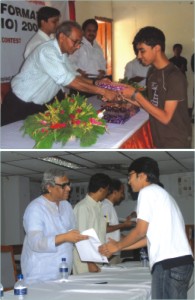 It is hard to believe that one can become a computer scientist under the age of 20 without studying in any university. Elementary, Middle, or even High school's curriculum does not teach that much computer science stuff to make a scientist. However, there are some outstanding young talents around the world who get the mastery of computer science at their very young age. One such talent is Reid Barton. He got the knowledge and skill on computer programming and algorithms while he was only in grade three. Barton has earned two gold medals at the International Olympiad in Informatics (IOI), earning a first place finish in 2001 by the largest gap between first and second place in the history of the IOI, with 580 points out of 600, 55 ahead of his nearest competitor. Barton and his team from MIT was ranked second in one contest (2001) and fifth in another contest in ACM International Collegiate Programming Contests (ICPC). ACM ICPC is a programming contest for the university and college students and a contestant can participate at most twice. Otherwise, Barton could have ranked top many times. Since we are talking about ACM ICPC I cannot resist myself talking about the performance of our Bangldeshi programmers, particularly, BUET students in ACM ICPC. Students of BUET Computer Science and Engineering (CSE) Department have qulifying for the ACM ICPC World Finals since 1998. Nearly 7000 contestants from approximately 83 contries compete in different regions to qualify for the World Finals. Only the champion and the runners up from a regional contest qualify for the World Finals. A team comprised of Sabbir Yousuf Sanny, Mahbubul Hasan Shanto, and Shariar Rouf of BUET won the champion position at the Asia Region Dhaka site in December 2007and qualified for the World Finals 2008, scheduled to be held on April 6-10 at Banff, Canada after defeating a very strong team from Fudan University, who has already qualified for the World Finals 2008 securing the champion position at the Asia Region Chinese site. This is really great! BUET students are qualifying for the World Finals for 11 years in row which is really a rare achievment for a university and only a few universities in the world have this record. This is ofcourse a great recognition and honor to BUET students and Bangladesh. If we want to name few top universities in the world, MIT, Barkley, Harvard and Stanford will offcourse be in the list. This is natural, they have enormous contribution in science an technology. In 2000, Mustaq, Ferdous, and Pappana from CSE department BUET has won the 11th position in ACM ICPC defeating MIT, Barkley, Harvard and Stanford. Mustaq, Ferdous, and Pappana's success still inspires our young programmers. It is hard to believe that one can become a computer scientist under the age of 20 without studying in any university. Elementary, Middle, or even High school's curriculum does not teach that much computer science stuff to make a scientist. However, there are some outstanding young talents around the world who get the mastery of computer science at their very young age. One such talent is Reid Barton. He got the knowledge and skill on computer programming and algorithms while he was only in grade three. Barton has earned two gold medals at the International Olympiad in Informatics (IOI), earning a first place finish in 2001 by the largest gap between first and second place in the history of the IOI, with 580 points out of 600, 55 ahead of his nearest competitor. Barton and his team from MIT was ranked second in one contest (2001) and fifth in another contest in ACM International Collegiate Programming Contests (ICPC). ACM ICPC is a programming contest for the university and college students and a contestant can participate at most twice. Otherwise, Barton could have ranked top many times. Since we are talking about ACM ICPC I cannot resist myself talking about the performance of our Bangldeshi programmers, particularly, BUET students in ACM ICPC. Students of BUET Computer Science and Engineering (CSE) Department have qulifying for the ACM ICPC World Finals since 1998. Nearly 7000 contestants from approximately 83 contries compete in different regions to qualify for the World Finals. Only the champion and the runners up from a regional contest qualify for the World Finals. A team comprised of Sabbir Yousuf Sanny, Mahbubul Hasan Shanto, and Shariar Rouf of BUET won the champion position at the Asia Region Dhaka site in December 2007and qualified for the World Finals 2008, scheduled to be held on April 6-10 at Banff, Canada after defeating a very strong team from Fudan University, who has already qualified for the World Finals 2008 securing the champion position at the Asia Region Chinese site. This is really great! BUET students are qualifying for the World Finals for 11 years in row which is really a rare achievment for a university and only a few universities in the world have this record. This is ofcourse a great recognition and honor to BUET students and Bangladesh. If we want to name few top universities in the world, MIT, Barkley, Harvard and Stanford will offcourse be in the list. This is natural, they have enormous contribution in science an technology. In 2000, Mustaq, Ferdous, and Pappana from CSE department BUET has won the 11th position in ACM ICPC defeating MIT, Barkley, Harvard and Stanford. Mustaq, Ferdous, and Pappana's success still inspires our young programmers.
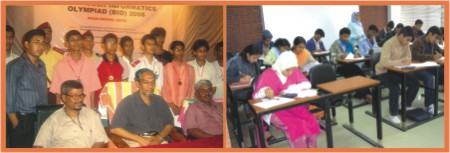
Don't mind, please, we were talking about Barton. He reached the finals of Top Coder Open and Top Coder Collegiate Challenge in 2004. Like Barton, we have many Bangladeshi programmers who are competing in Top Coder contests, the best among them is the RED Coder Abdullah Mahmud Satej. Mahmud, Sidky, and Sanny are also doing well in the top coder contests. Let's back to Reid Barton, he was working part-time with MIT computer scientist Charles E. Leiserson since eighth grade, he honed his abilities on CilkChess, one of the top computer chess programs at the time. Reid Barton's talent was not only limited to computer scince. He was the first student to ever win four gold medals at the International Mathematical Olympiad (IMO), culminating in full-marks at the 2001 Olympiad held in Washington, D.C. Barton has earned a place among the five top ranked competitors in the William Lowell Putnam Competition four times (20012004). He has won the Frank and Brennie Morgan Prize for Outstanding Research in Mathematics by an undergraduate student awarded jointly by the American Mathematical Society and the Mathematical Association of America for his work on packing densities.
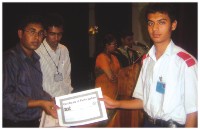 To find the young but exceptional talents like Reid Barton around the world and to recognize and patronize their talents from the early age International Olympiad in Informatics (Computer Science) has been organized since 1989. It has been originally proposed by UNESCO. First IOI was held in Pravetz, Bulgaria. Each country participates at the IOI with an official delegation, consisting of four student contestants, one leader and one deputy leader. Eligible contestants are students whose age is less than 20 years and who do not attend College or University (Bangladeshi HSC students are high school students ininternational standards). The contest consists of two days computer programming, solving problems of an algorithmic nature, however, the contestants have to show basic skills in problem analysis, design of the algorithm needed, data structures, as well as programming and testing of their solutions. Students compete on an individual basis, with up to four students competing from each participating country. More than 80 countries participate in each year. Students are selected through national computing contests. For example, American students compete in the USACO and Bangladeshi students compete in the BIO for a place in the corresponding national team. On each of the two competition days, the students are given three problems which they have to solve in five hours. Each student works on his/her own, with only a computer and no other help allowed, specifically no communication with other contestants, books etc. Usually to solve a task the contestant has to write a computer program (in C, C++ , Pascal, or Java) and submit it before the deadline ends. The program is graded later on by being run with secret test data, consisting of multiple (typically 10 or 20) test cases. The contestant is awarded points for each test case that his program solves correctly, and within the given time and memory limit. In some cases, the contestant's program has to interact with a secret computer library, which allows problems where the input is not fixed, but depends on the program's actions. To find the young but exceptional talents like Reid Barton around the world and to recognize and patronize their talents from the early age International Olympiad in Informatics (Computer Science) has been organized since 1989. It has been originally proposed by UNESCO. First IOI was held in Pravetz, Bulgaria. Each country participates at the IOI with an official delegation, consisting of four student contestants, one leader and one deputy leader. Eligible contestants are students whose age is less than 20 years and who do not attend College or University (Bangladeshi HSC students are high school students ininternational standards). The contest consists of two days computer programming, solving problems of an algorithmic nature, however, the contestants have to show basic skills in problem analysis, design of the algorithm needed, data structures, as well as programming and testing of their solutions. Students compete on an individual basis, with up to four students competing from each participating country. More than 80 countries participate in each year. Students are selected through national computing contests. For example, American students compete in the USACO and Bangladeshi students compete in the BIO for a place in the corresponding national team. On each of the two competition days, the students are given three problems which they have to solve in five hours. Each student works on his/her own, with only a computer and no other help allowed, specifically no communication with other contestants, books etc. Usually to solve a task the contestant has to write a computer program (in C, C++ , Pascal, or Java) and submit it before the deadline ends. The program is graded later on by being run with secret test data, consisting of multiple (typically 10 or 20) test cases. The contestant is awarded points for each test case that his program solves correctly, and within the given time and memory limit. In some cases, the contestant's program has to interact with a secret computer library, which allows problems where the input is not fixed, but depends on the program's actions.
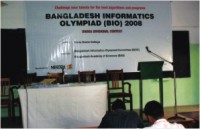 This might happen in game problems. Another new type of problems has known inputs which are publicly available already during the five hours of the contest. For these, the contestants have to submit the according output file instead of a program, and it is up to them whether they obtain the output files by writing a program (possibly exploiting special characteristics of the input), or by hand, or by a combination of these means. The scores from the two competition days and all problems are summed up separately for each contestant. At the awarding ceremony, contestants are awarded medals depending on their relative total score. The winners of the IOI belong, no doubt, to the best young computer scientists of the world. Bangladesh's participation in IOI has been started from 2006. Shumit, Fahim, and Sanny's team participated in 18th IOI (IOI 2006) held in Merida city of Mexico. 19th IOI was held in Zagreb, Croatia in 2007. Fahim has represented Bangladesh in 19th IOI. 20th IOI will be held in Alexandria, Egypt on August 16 to 23 this year. This might happen in game problems. Another new type of problems has known inputs which are publicly available already during the five hours of the contest. For these, the contestants have to submit the according output file instead of a program, and it is up to them whether they obtain the output files by writing a program (possibly exploiting special characteristics of the input), or by hand, or by a combination of these means. The scores from the two competition days and all problems are summed up separately for each contestant. At the awarding ceremony, contestants are awarded medals depending on their relative total score. The winners of the IOI belong, no doubt, to the best young computer scientists of the world. Bangladesh's participation in IOI has been started from 2006. Shumit, Fahim, and Sanny's team participated in 18th IOI (IOI 2006) held in Merida city of Mexico. 19th IOI was held in Zagreb, Croatia in 2007. Fahim has represented Bangladesh in 19th IOI. 20th IOI will be held in Alexandria, Egypt on August 16 to 23 this year.
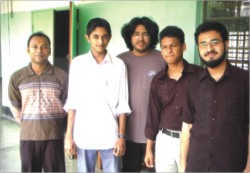 Bangladesh Informatics Olympiad (BIO) is Bangladesh national contest of IOI. It is being organized by Bangladesh Informatics Olympiad Committee (BIOC) and Bangladesh Academy of Sciences (BAS). BAS, established in 1973, is a national, non-governmental organization, recognized and financially supported by the government and considered as the apex body in science and technology in Bangladesh. The main objective of the Academy is to enhance science and technology in Bangladesh. In this context the Academy recognizes and promotes high calibre scientific research done by scientists, facilitates their mutual contacts, strengthens scientific and technological work and fosters it for social and economic development for the welfare of the people. Professor M. Shamsher Ali and Professor Naiyyum Choudhury are the current BAS president and secretary respectively. BIOC is formed under the leadership of eminent scientist and academician like Dr Muhammad Zafar Iqbal and Dr. M. Kaykobad in the field of Information and Communication Technology (ICT) to help the nation in capacity building of the young and talented people for the future and excel in the changing dimension with IOI. Let's talk about BIO, which serves as the qualifying round for the IOI. The first BIO was held in 2004. BIO is held in two phases: regional and national. BIO regional contests, presently held at 5 divisional headquarters (Dhaka, Chittagong, Rajshahi, Khulna, and Sylhet), serve as the qualifying round for the BIO national contest. BIO regional contests for this year will be held on March 28, 2008 at 5 divisions simultaneously and BIO 2008 national contest will be held on April 11, 2008 at Dhaka. Followings are the venues of BIO regional and national contests for 2008. Bangladesh Informatics Olympiad (BIO) is Bangladesh national contest of IOI. It is being organized by Bangladesh Informatics Olympiad Committee (BIOC) and Bangladesh Academy of Sciences (BAS). BAS, established in 1973, is a national, non-governmental organization, recognized and financially supported by the government and considered as the apex body in science and technology in Bangladesh. The main objective of the Academy is to enhance science and technology in Bangladesh. In this context the Academy recognizes and promotes high calibre scientific research done by scientists, facilitates their mutual contacts, strengthens scientific and technological work and fosters it for social and economic development for the welfare of the people. Professor M. Shamsher Ali and Professor Naiyyum Choudhury are the current BAS president and secretary respectively. BIOC is formed under the leadership of eminent scientist and academician like Dr Muhammad Zafar Iqbal and Dr. M. Kaykobad in the field of Information and Communication Technology (ICT) to help the nation in capacity building of the young and talented people for the future and excel in the changing dimension with IOI. Let's talk about BIO, which serves as the qualifying round for the IOI. The first BIO was held in 2004. BIO is held in two phases: regional and national. BIO regional contests, presently held at 5 divisional headquarters (Dhaka, Chittagong, Rajshahi, Khulna, and Sylhet), serve as the qualifying round for the BIO national contest. BIO regional contests for this year will be held on March 28, 2008 at 5 divisions simultaneously and BIO 2008 national contest will be held on April 11, 2008 at Dhaka. Followings are the venues of BIO regional and national contests for 2008.
Dr. Md. Humayun Kabir, Secretary BIOC, Associate Professor, Computer Science and Engineering Department, BUET
Copyright
(R) thedailystar.net 2008 |

